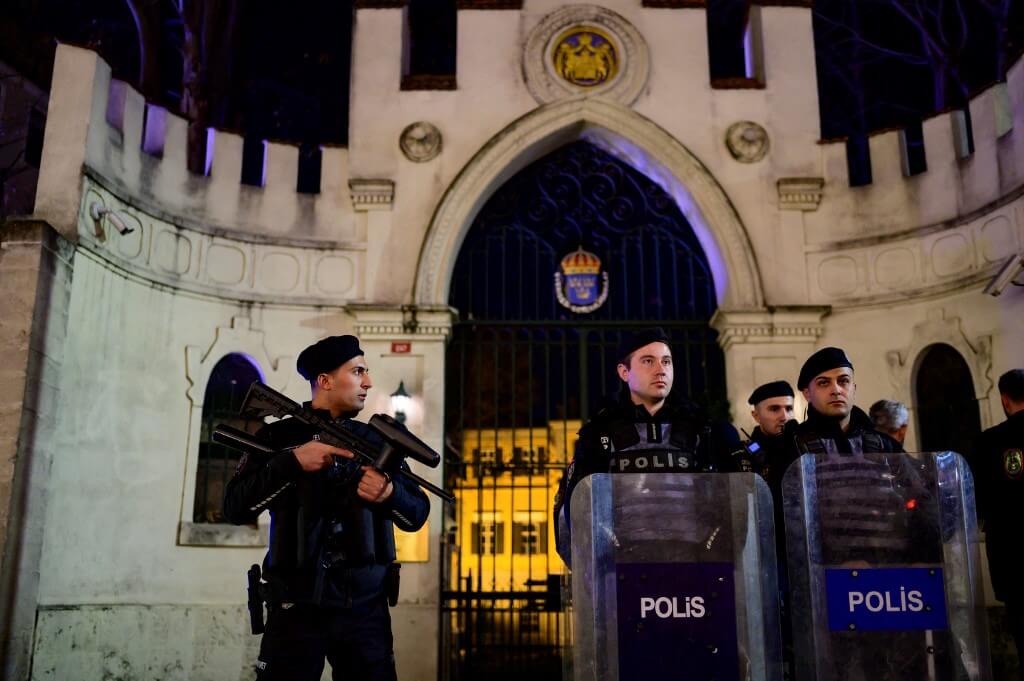Plans by the Islamic State in Iraq and the Levant – Khorasan (ISIL-K) to launch attacks on the Swedish and Dutch consulates in İstanbul as well as several churches and synagogues were revealed in a detailed indictment drafted by the İstanbul Chief Public Prosecutor’s Office, the Artı Gerçek news website reported.
According to the special report, the indictment concerns the arrest and confession of a 45-year-old leader of ISIL-K İstanbul, identified only by the initials A.C., a Kyrgyz national of Tajik origin. A.C. was arrested in a police operation last year and has been detained since then.
The indictment states that the planned attacks were a reaction to the burning of the Quran in front of the Great Mosque in Stockholm in March 2023. The militants wanted to use suicide bombers for the attacks on the consulate and were looking for ways to “increase the number of victims.”
A.C. described in detail ISIL-K’s operations, including the use of Turkey as a base for moving fighters from Central Asia and Russia to conflict zones in Syria and Afghanistan. The indictment charges a total of 18 suspects, including people from Dagestan, Turkmenistan, Kyrgyzstan, Tajikistan and Azerbaijan, as well as Turkish national O.I.
ISIL-K operatives allegedly used the “dead letter” method commonly employed in espionage and intelligence circles for the transfer of weapons and explosives. The indictment describes how weapons and explosives intended for attacks in Turkey and Afghanistan were hidden at predetermined coordinates and buried underground.
A.C.’s first task was to facilitate the transfer of Central Asians to Syria. On the instructions of ISIL-K, he moved to Turkey in 2015, using an illegal route through Iran. In İstanbul he was involved in arranging accommodation and fake identities for ISIL-K fighters and coordinating their transfer to Afghan conflict zones.
The indictment describes plans for an attack on the Swedish consulate after the Quran burning in Stockholm. Three ISIL-K fighters, two Chechens and one Azerbaijani were deployed for this attack. They scouted the area around the consulate and planned to breach security and use hand grenades to increase the number of casualties.
In addition to the consulates, the indictment also includes plans for attacks on churches and synagogues near Taksim Square in Istanbul, in particular the Surp Pirgic Armenian Catholic Church, the Neve Shalom Synagogue and the Ashkenazi Synagogue.
Difficulties in procuring weapons and explosives for the planned attacks led to tensions between A.C. and the Afghan leadership of ISIL-K. Disillusioned with the ideology of ISIL-K, A.C. decided to become an informant. He contacted the Kyrgyz consulate in İstanbul and offered to pass on information to the Turkish authorities in exchange for protection.
After his confession, A.C. was contacted by Kyrgyz security officials who promised to facilitate his cooperation with the Turkish authorities. This led to a secret meeting with a Kyrgyz diplomat in Maltepe, during which A.C. provided detailed information about the planned attacks.
After his superiors in the ISIL-K group became suspicious, A.C. approached the authorities and asked for help. He was subsequently arrested and is currently awaiting trial.
According to a report by Turkey’s state-run Anadolu news agency, the National Intelligence Organization’s (MİT) efforts to counter ISIL throughout 2023 resulted in the apprehension of 426 ISIL suspects in 122 operations.
Turkey declared ISIL a terrorist organization in 2013 and has been attacked by the group multiple times since then. A total of 315 people were killed and hundreds more were injured in at least 10 suicide bombings, seven bomb blasts and four armed attacks carried out by ISIL in the country.

